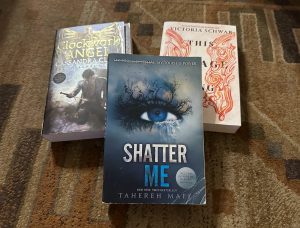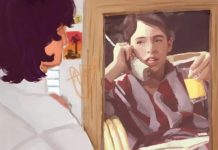
YA Hall of Fame// Famous young adult novels sit amongst one another, each showing off their “unique female main hero.” Are these so-called mainstream heroines really worth the hype? (Photo by Brianna Gracia)
What makes a girlboss?
by Brianna Gracia
Strong. Gorgeous. Sarcastic. Body like a model. All of the qualities of being a powerful female protagonist. Disregard a work ethic, compassion, or regard for other human beings. As long as someone is built like a Barbie doll and has “gorgeous blue orbs,” they meet all of the qualifications.
One might argue this is nothing more than a laughable trope or trend until they look deeper. This trope isn’t just imposed on adult literature, but works its way into the books and movies at young children’s fingertips. Little girls as young as six or seven are introduced to literary role models that are not only unrealistic but unhealthy.
The Hollywood industry is guilty of this, too. How many times have you seen someone outside of the “Barbie mold” play a leading lady? How many women of color play superheroes? How many Asian women don’t play the ditzy nerd best friend? The truth is, not many.
With entertainment so accessible, it isn’t hard to find an example. Viral book series such as Shatter Me, Divergent, and Twilight promote female main characters that aren’t “like other girls.” They’re often cold, standoffish, and have no personality outside of their love interest or the sake of the plot – they are completely underdeveloped. They’re “unbelievably beautiful,” and everyone seems to be in love with them. Imagine having one of these ladies be your standard for womanhood. Unfortunately, this was, and still is the case for many women growing up.
Some claim this image is a response to backlash over the “damsel in distress” trope. In older media, women were often portrayed as helpless, needing to be rescued by a man and unable to fend for themselves. This was just as harmful of an image. Instead of creating a healthy balance of representation, what did Hollywood and mainstream writing turn to? Create a woman with no emotional sensitivity, flawless beauty, and no personality. That would surely make things right.
What they didn’t understand at the time was women weren’t necessarily saying that gentleness equaled weak representation. It was the idea that a woman cannot be soft and still be capable. She cannot be independent and wish to be treated every once in a while. What girls were dying to see in their favorite books and movies wasn’t some impossible goddess with no flaws, but someone they could relate to.
Luckily, where the media has been at fault, it has also, strangely, provided a solution. Across platforms like TikTok and Instagram, a new wave of women and girls are promoting embracing their femininity.
A new wave of movies and TV shows are also emerging that are “embracing girlhood.” Titles such as Barbie, Fiona and Cake, Mutant Mayhem, and The Owl House have a cast of diverse female characters that don’t shy away from emotional expression and all forms of feminity.
What it comes down to is this: there is no right way to be a woman. She can be sarcastic, wearing crop tops and jeans, or she can enjoy dresses and Disney movies. No value is judged by the way a woman decides to dress, act, or identify.











